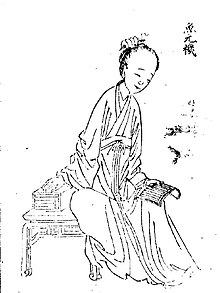Yu Xuanji
Yu Xuanji | |
|---|---|
 Yu Xuanji | |
| Born | c. 840 |
| Died | c. 868(aged 28) |
| Cause of death | Execution |
| Nationality | Chinese |
| Other names | Youwei Huilan |
| Occupation | poet |
| Spouse | Li Yi |
Yu Xuanji(simplified Chinese:Ngư huyền cơ;traditional Chinese:Ngư huyền cơ;pinyin:Yú Xuánjī;Wade–Giles:Yü Hsüan-chi,c. 840– c. 868),[1]courtesy namesYouwei (Chinese:Ấu vi;pinyin:Yòuwēi) and Huilan (simplified Chinese:Huệ lan;traditional Chinese:Huệ lan;pinyin:Huìlán), was a Chinese female poet of the lateTang dynasty,fromChang'an.She was one of the most famous women poets of Tang, along withXue Tao.[2][3]
Biography
[edit]Little trustworthy information is available about the relatively short life of Yu Xuanji.[1]She was born or grew up in Tang capitalChang'an,[4]which was the terminus of theSilk Roadand one of the most sophisticated cities of its time. Yu was aconcubineor a lesser wife to an official named Li Yi (simplified Chinese:Lý ức;traditional Chinese:Lý ức;pinyin:Lǐ Yì) at 16, separating three years later because of Li's primary wife's dislike of Yu.[5]
She had a "painted boat" on theWei River.[6]Yu later took her vows and became aDaoistnun at the Xianyi guan ( hàm nghi quan, Abbey of Universal Benefit).[7]Daoist nuns were at the time known for their sexual freedom[8][9]During her time as a nun she travelled frequently and her travels influenced her writing.[8]Yu had a reputation for being sexually adventurous and is recognised by some as China's first openlybisexualfemale.[8]
She was a fellow ofWen Tingyun,to whom she addressed a number of poems. Apart from names and dates in her poems, the tabloid-styleLittle Tablet from the Three Rivers,(Tam thủy tiểu độc), gives the only purported facts about her life. These are however salacious in detail: it reports she had an affair with Wen Tingyun, lived a scandalously promiscuous life, and was executed by decapitation[5]at the age of 28[1]for allegedly strangling her maid, Luqiao, to death.[5]This account is considered semi-legendary, and may be a reflection of the traditional distrust of women who were strong-willed and sexually independent.[3]
Poetry
[edit]Yu Xuanji is distinctive for the quality of her poems, including many written in what seems to be a remarkably frank and direct autobiographical style; that is, using her own voice rather than speaking through apersona.In her lifetime, her poems were published as a collection calledFragments of a Northern Dreamland,which has been lost. The forty-nine surviving poems were collected in theQuan Tangshi,[5]mainly for their freak value in an anthology that also included poems from ghosts and foreigners.[10]
English translations
[edit]Published in 1998, her work was translated by the team of David Young and Jiann I. Lin.[11]In the 2000s, her work was translated byStephen OwenandJustin Hill.
Name
[edit]Her family name, Yu, is relatively rare. Her given name, Xuanji, means something like "Profound Theory" or "Mysterious Principle," and is a technical term in Daoism and Buddhism. "Yòuwēi" means something like "Young and Tiny;" and, Huìlán refers to a species of fragrant orchid.[1]
Media
[edit]In 1984 theShaw Brothers StudioinHong Kongmade a film about her life entitledĐường triều hào phóng nữ(An Amorous Woman of Tang Dynasty), starredPat HaandAlex Man.[5]
In 1988, theAsia Television Limitedin Hong Kong filmed ananthology drama seriesabout her life, titledLịch đại kỳ nữ tử(Those Famous Women in Chinese History), starredBonnie Ngai,Pat PoonandKingdom Yuen
Yu Xuanji is the subject of the 1915 short storyGyogenkiby Japanese authorMori Ōgai.[12]She was the nun in Robert van Gulik's 1968 "Judge Dee"novelPoets and Murder.[13]
Justin Hill'sSomerset Maugham Awardaward-winning novel Passing Under Heaven reimagines Yu Xuanji's life.[14]
References
[edit]- ^abcdYoung & Lin 1998,p. ix.
- ^Jia, Jinhua (2018-03-13).Gender, Power, and Talent: The Journey of Daoist Priestesses in Tang China.Columbia University Press. p. 167.ISBN978-0-231-54549-5.
This later emendation is not supported by any evidence from earlier editions and was likely made by someone with a bias against Yu Xuanji. However, it has led some scholars to mistakenly identify Yu as a courtesan.
- ^abChang, Saussy & Kwong 1999,p. 66.
- ^Young & Lin 1998,p. ix, citing theGuoyu Cidian..
- ^abcdeKohn & Roth 2002,p. 102.
- ^Kohn & Roth 2002,p. 114.
- ^Kohn & Roth 2002,p.[page needed].
- ^abcOlivia Bullock ( ngải văn đình ) (21 October 2014)."Badass Ladies of Chinese History: Yu Xuanji".The World of Chinese.Retrieved20 December2018.
- ^Chang, Saussy & Kwong 1999,p. 67.
- ^Young & Lin 1998,p. x.
- ^Young & Lin 1998,p. iii.
- ^Mori 1991,p. 185.
- ^Lee & Wiles 2014,p. 571.
- ^"Passing Under Heaven".Justin Hill.18 December 2014.Retrieved17 January2019.
Sources
[edit]- Chang, Kang-i Sun;Saussy, Haun;Kwong, Charles Yim-tze (1999).Women Writers of Traditional China: An Anthology of Poetry and Criticism.Stanford University Press.ISBN9780804732314.
- Fu, Shousun,"Yu Xuanji".Encyclopedia of China(Chinese Literature Edition), 1st ed. Archived fromthe originalon 29 September 2007.(in Chinese)
- Kohn, Livia; Roth, Harold David (2002).Daoist Identity: Cosmology, Lineage, and Ritual.University of Hawaii Press.ISBN978-0-8248-2504-1.
- Lee, Lily Xiao Hong; Wiles, Sue (2014).Biographical Dictionary of Chinese Women: Tang Through Ming, 618-1644.M.E. Sharpe.ISBN9780765643162.
- Mori, Ogai (1991). Dilworth, David; Rimer, J. Thomas (eds.).The Historical Fiction of Mori ÅOgai.University of Hawaii Press.ISBN9780824813666.
- Xuanji, Yu; Yü, Hsüan-chi (1998).The Clouds Float North: The Complete Poems of Yu Xuanji.Translated by Young, David; Lin, Jiann I. Wesleyan University Press.ISBN9780819563446.
- 840s births
- 869 deaths
- 9th-century executions
- 9th-century Chinese poets
- 9th-century Chinese women writers
- Chinese women poets
- Executed Chinese women
- Executed people from Shaanxi
- Executed Tang dynasty people
- People executed by the Tang dynasty
- Poets from Shaanxi
- Tang dynasty poets
- Tang dynasty Taoists
- Writers from Xi'an
- Taoist nuns
- 9th-century Taoists

